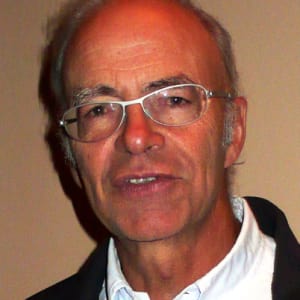
Peter Singer
Peter Singer is an Australian philosopher whose work in applied ethics has led to controversial views on abortion, animal liberation and infanticide.
Synopsis
Born in Melbourne, Australia, in 1946, Peter Singer attended the University of Melbourne, where he earned both a B.A. and an M.A. in philosophy. In 1969 he enrolled at the University of Oxford, receiving his B.Phil. degree from the school two years later. Over the course of his long career, Singer has become one of the leading bioethicists and one of the founders of the animal rights movement.
Early Years
Hailed for his work in bioethics and one of the key founders of the animal rights movement, Peter Albert David Singer has been called the most controversial and influential philosopher alive today.
Born July 6, 1946, in Melbourne, Australia, Singer is the son of Jewish parents who escaped Nazi-ruled Vienna in 1938. Singer grew up in Melbourne, where he eventually attended the University of Melbourne, from which he earned his B.A. and M.A. in philosophy in 1967 and 1969, respectively.
Following his graduation from his home city university, Singer enrolled at the University of Oxford, earning his B. Phil. degree from the school in 1971. Singer remained at Oxford the next two years, working as a Radcliffe Lecturer in Philosophy at University College.
Singer's time in England proved instrumental. There, he became committed to vegetarianism. His affiliation with the cause led to his controversial and well-known publication Animal Liberation: A New Ethics for Our Treatment of Animals in 1975.
The work's publication articulated a careful argument that gave moral standing to animals. It also drew greater awareness to abuses at factory farms and scientific research, while also helping to lay the groundwork for other debates around stem-cell research and third-trimester abortions.
In addition, it pointed Singer on a path of activism that has touched a range of causes, from environmentalism and women's rights, to anti-war causes and civil rights.
Controversial Figure
Singer's willingness to wade deep into controversial topics has made him a lightning rod for groups around the world. Driving much of his work is his own embrace of utilitarianism, an ethical philosophy that holds that the best actions are those that maximize happiness and reduce suffering.
Throughout his long career, Singer has been a strong proponent of eliminating poverty, arguing that anyone who has more than they need should be giving to those in need.
In what some consider his most controversial work, Practical Ethics (1979), Singer looked closely at why and how a living being's interests should be valued. The work tackled a number of hot-button topics as Singer evaluated the philosophical and ethical underpinnings behind sex discrimination, animal welfare, foreign aid and abortion.
Among pro-life activists in particular, Singer has proven to be a popular target. His belief that newborns should not be considered a person until 30 days after their birth, and his allowance that physicians should have the right to kill some disabled babies, has drawn condemnation from anti-abortion leaders from around the world.
Princeton Appointment
In 1999, Princeton University came under heavy fire for its appointment of Singer as the DeCamp Professor at the Center for Human Values.
Princeton's president, Harold Shapiro, stood his ground and quickly defended the decision. "His books, including Animal Liberation and Practical Ethics, have been translated into 15 languages and have been widely taught in ethics classes throughout Europe and the United States, including here at Princeton," wrote Shapiro. "He is a gifted teacher, whose clarity and originality have made ethical issues come alive to a broad intellectual audience."
With all the controversy, however, has come praise. In 2004 Singer was honored as the Australian Humanist of the Year. Not long after, Time magazine named Singer to its list of the world's 100 most influential people. In June 2012, Singer was also named a Companion of the Order of Australia for his work in philosophy and bioethics.



